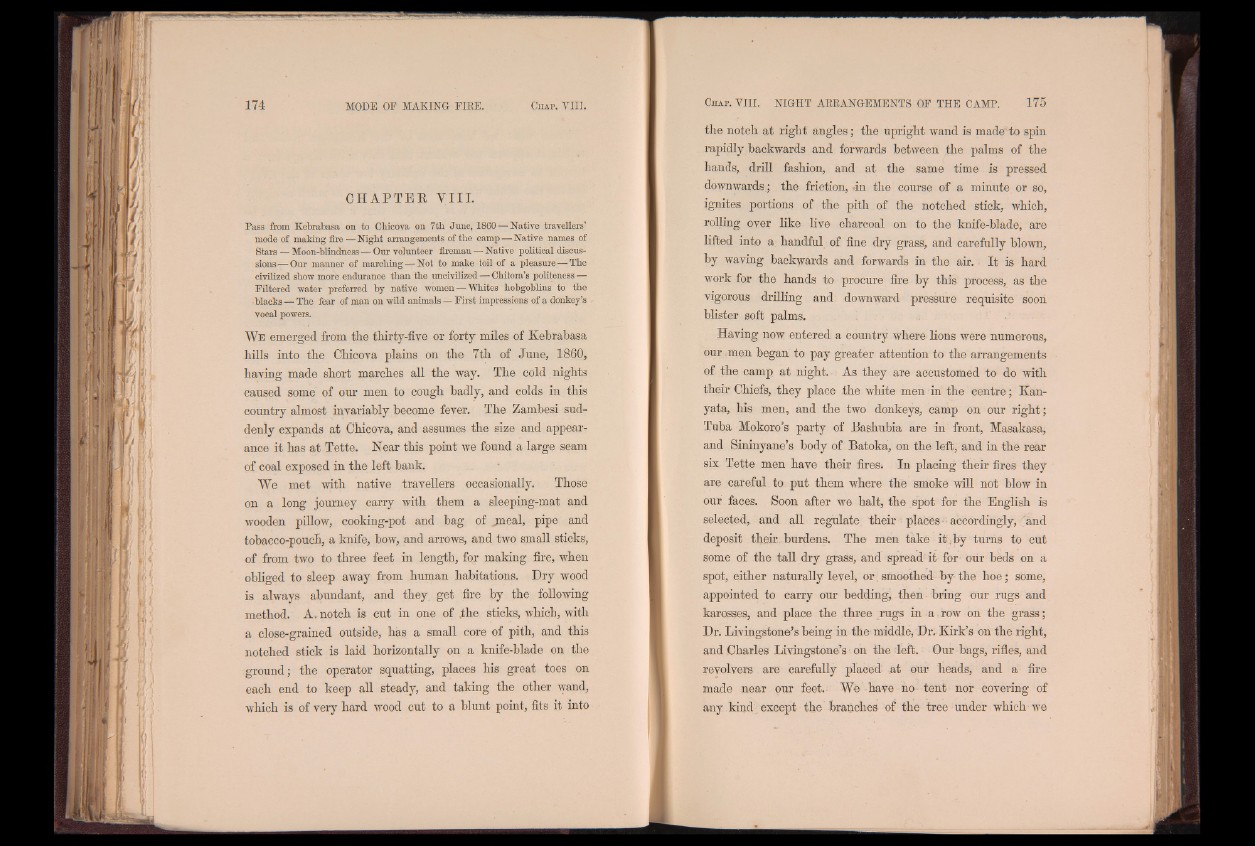
C H A P T E R YI I I .
Pass from Kebrabasa on to Chicova on 7th June, 1860 — Native travellers1
mode of making fire — Night arrangements of the camp — Native names of
Stars — Moon-blindness — Our volunteer fireman — Native political discussions—
Our manner of marching —Not to make toil of a pleasure — The
civilized show more endurance than the uncivilized — Chitora’s politeness —
Filtered water preferred by native women — Whites hobgoblins to the
•blacks — The fear of man on wild animals — First impressions of a donkey’s
vocal powers.
W e emerged from the thirty-five or forty miles of Kebrabasa
hills into the Chicova plains on the 7th of June, 1860,
having made short marches all the way. The cold nights
caused some of our men to cough badly, and colds in this
country almost invariably become fever. The Zambesi suddenly
expands at Chicova, and assumes the size and appearance
it has at Tette. Near this point we found a large seam
of coal exposed in the left bank.
We met with native travellers occasionally. Those
on a long journey carry with them a sleeping-mat and
wooden pillow, cooking-pot and bag of jneal, pipe and
tobacco-pouch, a knife, bow, and arrows, and two small sticks,
of from two to three feet in length, for making fire, when
obliged to sleep away from human habitations. Dry wood
is always abundant, and they, get fire by the following
method. A. notch is cut in one of ,the sticks, which, with
a close-grained outside, has a small core of pith, and this
notched stick is laid horizontally on a knife-blade on the
ground; the operator squatting, places his great toes on
each end to keep all steady, and taking the other wand,
which is of very hard wood cut to a blunt point, fits it into
the notch at right angles; the upright wand is made'1 to spin
rapidly backwards and forwards between the palms of the
hands, drill fashion, and at the same time is pressed
downwards; the friction, fin the course of a minute or so,
ignites portions of the pith of the notched stick, which,
rolling over like live charcoal on to the knife-blade, are
lifted into a handful of fine dry grass, and carefully blown,
by waving backwards and forwards in the air. I t is hard
work for the hands to procure fire by this process, as the
vigorous drilling and downward pressure requisite soon
blister soft palms. . •
Having now entered a country where lions were numerous,
our men began to pay greater attention to the arrangements
of the camp at night. As they are accustomed to do with
their Chiefs, they place the white men in the centre; Kan-
yata, his men, and the two donkeys, camp on our right;
Tuba Mokoro’s party of Bashubia are in front, Masakasa,
and Sininyane’s body of Batoka, on the left, and in the rear
six Tette men have their fires. In placing their fires they
are careful to put them where the smoke will not blow in
our faces. Soon after we halt, the spot for the English is
selected, and all regulate their places- accordingly, and
deposit their , burdens. The men take it1, by turns to cut
some of the tall dry grass, and spread it for our beds on a
spot, either naturally level, or. sfnoothed by the hoe; some,
appointed to carry our bedding, then bring our rugs and
karosses, and place the three „rugs in a row on the grass;
Dr. Livingstone’s being in the middle, Dr.-Kirk’s on the right,
and Charles Livingstone’s on the left. Our bags, rifles, and
revolvers are carefully placed .at our heads, and a fire
made near our feet. We-have no-tent nor covering of
any kind except the branches of the tree under which we